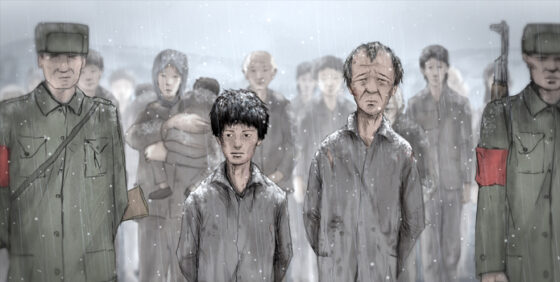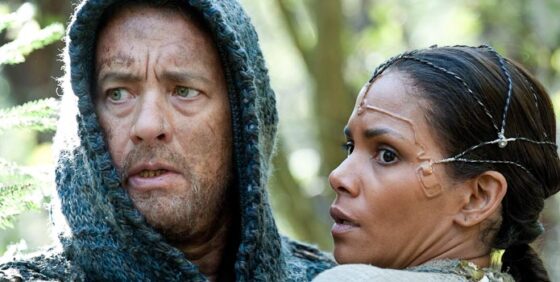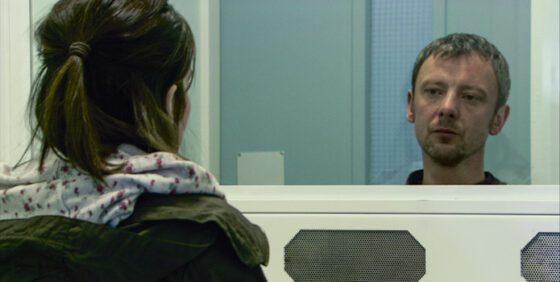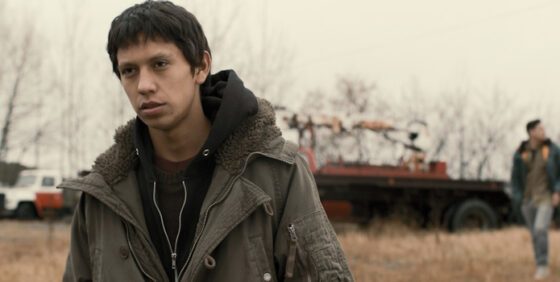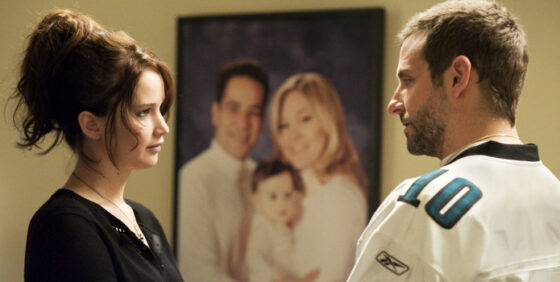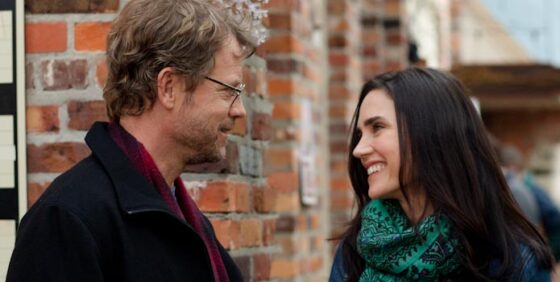TIFF Day 6: Camp 14: Total Control Zone | Cloud Atlas | Everyday | In Another Country | Key of Life | The Lesser Blessed | London – The Modern Babylon | Silver Linings Playbook | When I Saw You | Writers
Camp 14: Total Control Zone (Marc Wiese, Germany)—TIFF Docs
By Adam Cook
Camp 14 is not the most enjoyable film: it’s not easy to watch, it’s slow, and the subject matter is difficult territory, but it’s territory explored with commendable moral intelligence by director Marc Wiese. The main subject of the film is Shin Dong-huyk, a 29-year-old man who was born in a North Korean labour camp, which he escaped at the age of 23. While Wiese devotes a considerable amount of screen time to two other subjects, men that used to be camp guards, the focus of the film is squarely on Shin, who recalls his time in the camp and talks about the difficulty of adjusting to normal life. The film exposes this terrifying vacuum that almost seems like a different world, where the value of human life has been forgotten. An early sequence of Camp 14 has Shin describing the camp to an artist, who draws it on the spot; the film continues this thread with expressive animated reimaginings of Shin’s stories, which Wiese uses sparingly and effectively. From Shin’s moving tale to the complex portraits of the former guards, Camp 14 leaves the viewer with much to think about, and Wiese smartly refrains from imposing his own ideas; rather, he finds in Shin’s solemn persistence in a world he struggles to cope with, a fragile sense of hope.
Cloud Atlas (Tom Tykwer, Andy Wachowski, Lana Wachowski, Germany)—Special Presentation
By John Semley
Or, The Sextuple Life of Moronique. Claims that David Mitchell’s apparently popular sci-fi tome is “unfilmable” are validated way too late; alas, Cloud Atlas was filmed. All sag, bloat, and Tom Hanks in shitty beards, Atlas endeavours to trace the enduring power of love and butterfly-effects human connection across however many hundreds of years, reincarnating its long, long, long-suffering cast (Hanks, Halle Berry, Hugo Weaving, Doone Bae, Ben Wishaw, Jim Strugess, the flesh Muppet that is Jim Broadbent, and even Hugh Grant) across intercut narratives about people trapped by oppressive social forces: an old folk’s home, a composer’s mansion, a cannibal cult, a China Syndrome conspiracy, a futuristic Korean android-flesh-harvesting ring, etc., etc., etc., etc., etc.
That Cloud Atlas’ theme is no less than the actual quantifiable existence of love itself (“My father was a scientist, but he believed that love was real,” someone says, an example of the script’s rat’s nest of New Age-y clichés) promised a grandly ambitious disaster on the scale of Southland Tales (2006). No dice. Where Kelly’s rapturous fuck-up is a preeminent example of reach exceeding grasp, the ludicrous Wachowski/Tykwer triple-threat drives Atlas’ ostensible ambitions into blandly cross-cut monotony and thematic stupidity. Every time the film veers promisingly into arch-Wachowski territory—as in the Neo-Seoul segment, which builds out the ersatz topography of Speed Racer (2008)—Tykwer’s perfumed pomposity reels things back in, keeping the film from ever flying compellingly off the rails. There is nothing remotely noble, or interesting, about Cloud Atlas’ seemingly inevitable failure. And Jesus Christ, is it ever fucking long.
Everyday (Michael Winterbottom, UK)—Masters
By Michael Sicinski
Chance. Serendipity. Kismet. The Fickle Finger of Fate. What I’m trying to do here is to create a context wherein I thought I was doing something “daring” by opting not to correct somebody else’s fuck-up. The first day of TIFF is always rough, as the volunteers are still gathering their sea legs. Long story short, I requested a ticket for Ruiz’s Night Across the Street and, once I was back at the hotel, discovered they’d given me one for this Michael Winterbottom thing instead. Considering how jam-packed my schedule was, I didn’t really have time to go stand in line to make an exchange. I was just about to throw the ticket in the recycle bin when I thought, Hey, wait a minute . . . What if I just “roll” with this, you know? After all, Old Winterbutt has made some decent movies. I’ll give it a shot. My half-dazed assessment, of course, failed to recall that Winterbottom had exactly three decent movies, all of which were driven start to finish by Steve Coogan.
No such luck here. Everyday does have the good fortune of being anchored by Shirley Henderson, a gifted actor whose deep-set obsidian eyes and gangly limbs could easily coalesce into a shtick-persona for her (“Olive Oyl UK”), but for her keen expressive control. But all else here is boilerplate TV drama bundled together with a gimmick. Henderson plays the beleaguered Karen, mother of four (played by the actual Kirk siblings), whose husband Ian (John Simm) has been sent up the river for five years. Everyday consists of Karen and the kids struggling to maintain a relationship with the head of household while he’s behind bars. And [CHECK IT OUT!] Winterbottom and company actually shot it over five years, so as to capture the cast’s natural aging process.
Trouble is, Winterbottom and co-writer Laurence Coriat forgot to put much of anything inside this pseudo-experimental husk. What does Everyday show us? Prison is dull, kids come to resent an absent father, furlough days are like magical gifts from God, and no matter how loving or tight-knit they may be, a family with the dad in jail probably suffers from other irresponsible adult decision-making, such as leaving the kids to their own devices (in the park; in grandpa’s gun shed) while Mom and Dad have a day-pass shag. For its part, Everyday does the “admirable” thing, observing but withholding judgment. However, the very extent to which Winterbottom does this is overweening and calculated. The film makes it a point to never tell us what Ian’s in for. It also makes Her Majesty’s Prison look more like an extended time-out than a traumatic shank-and-rape hellhole. Point being, Everyday will not do anything whatsoever that might disrupt our sympathy with Ian, even for a moment. (Karen, on the other hand . . .) Add to this a career-worst soundtrack from Michael Nyman (the groove-stuck, triumphal horns sound like they should be selling life insurance), and we practically have a paid-political for Liberal Self-Congratulation. It even ends with the family running along the British coastline, free. Based on Ian and Karen’s behaviour through the rest of the film, it’s clear that someone’s getting lucky tonight, but it won’t be the audience.
In Another Country (Hong Sang-soo, South Korea)—Masters
By Mark Peranson
Hong Sang-soo’s zoomarific In Another Country is about culture clash, in the form of how three somewhat similar characters called Anne (a delightful Isabelle Huppert x3, in the first part playing Claire Denis) is treated in her visit to the small Korean coastal town of Mohang by, among others, her past/current lovers, other women, and the local lifeguard who not only croons her a love song, but also, in the line of the festival, vows that if she swims, “I will protect you!” (recent Hong superstar Yu Jun-sang, hilarious and touching, but mostly hilarious). Isabelle Huppert reminds me of that old television commercial where the most non-absorbent substances imaginable are wiped away by a miracle cloth in an effortless swipe. The danger of unbridled Huppert, as witnessed in Berlin in Brillante Mendoza’s messy failure, Captive, is that she tends to control films rather than allowing herself to submit to a structure, turning almost any director’s work into an “Isabelle Huppert film.” Hong’s wonderful, breezy comedy sees the soju-swigging Huppert being fully integrated, if not being completely absorbed, into Hong’s masterful system, without the benefit of invisible late-night special effects. As in the town itself, there is always the threat of rain—“It’s raining,” one character tells Anne, after she has already asked for an umbrella, for which Anne is rewarded by a personal tour of the town—but it never pours.
Critics tend to mistakenly posit that Hong’s formal repetitions and musical variations within and between his films are an ouroboros-like comment on their own natures. Any foreigner who has ever been to Korea can realize the heightened realism inherent in Hong’s prototypical approach, the speech patterns, the repetition of banalities and small talk, the need for men and women to be as clear as possible in the most inconsequential exchanges, and letting loose when it matters (especially if soju is involved). Framed as a screenplay being written by a woman on the run from tax problems, In Another Country is ultimately another recent Hong film about masculinity told through a woman’s perspective (see also the end of Oki’s Movie [2010]). The slight differences between the three parts show that, for example, with a foreigner, Korean men take only as much as they can get, and that even if they play their cards right, foreign women can have the power. And, that sometimes the only thing that interferes with love is language. The same critics also tend to ask silly questions such as, “Is In Another Country the best of Hong’s recent films?” Who cares. That’s like trying to tell the difference in a blind taste test between bottles of Cass, Max, and Hite. Effortless products of an auteur’s will, Hong’s infinitely pleasurable films reside in another country of their own.
Key of Life (Uchida Kenji, Japan)—Contemporary World Cinema
By Kong Rithdee
The tired old trick of mistaken identities get an intelligent, amusing, and casually touching reboot in Kenji Uchida’s film about a yakuza fixer who’s lost his memory after a concussion and is half-forced to assume the role of a struggling actor. “Your life depends on your acting,” a character says at one point, and the film, which is buoyed by deadpan humour and candour, flirts with the meta-quality of life as one long drama and identity as a cunning hybrid of fate and manufacturing. Teruyuki Kagawa, tense and tender, plays Kondo, a Beethoven-loving contract killer whose wallet, locker key, and identity are stolen by Takeshi (Masato Sakai), an unemployed loser who claims to be a great disciple of Method acting even though he only scrapes by playing faceless extras in low-budget films. Takeshi assumes the life and professional role of Kondo the cool assassin, fumbling his way through a job that requires him to whack the mistress of a business tycoon. It could’ve all gone mushy when Kondo, in turn becoming Takeshi, meets an adorable wonk, a magazine editor who’s already set her wedding date and vowed to find a suitable man before the self-imposed deadline. But Uchida’s touch is light without being flimsy, and Key of Life skips along with a fine mix of cartoonish playfulness and genuine sentiment. Not just life, but also a good movie depends on acting, and Kagawa holds the key that fits nicely here.
The Lesser Blessed (Anita Doron, Canada)—Contemporary World Cinema
By John Semley
Often enough, you can read a Telefilm-funded Canadian feature through the requisite loaned American ringer—in the case of The Lesser Blessed, Benjamin Bratt (an American of Peruvian Indian descent passing himself off as a Canadian Aboriginal) plays Jed, a bush pilot, tracker, and father surrogate to Joel Nathan Evans’ troubled teenager Larry. The story of a maladjusted loner growing up in a barren Northwest Territories town, The Lesser Blessed isn’t out-and-out embarrassing, just thoroughly middling. The film stays almost claustrophobically close to Larry as he struggles with some past demon (intimated through soft-focus flashbacks), forges a friendship with the new kid in town (Kiowa Gordon), and sheepishly pines for the coolest girl in school (Chloe Rose). Like Daydream Nation (2010) and The Odds (2011), The Lesser Blessed feels like a Canadianized stab at teenage melodrama: bullies bully, students prank hapless homeroom teachers, kids menacingly eyeball each other before fighting, deadbeat dads linger on the periphery like ghosts, the dream girl’s name is “Juliette Hope” and the badass new kid is called “Johnny Beck,” which might as well be “James Dean” or “Joey Laser.” It’s intermittently amusing, seeing such broad, often silly adolescent dramatics play out in the context of a northern trailer community, and a few colourful touches, like a hypnotic hot-knives party scene, make The Lesser Blessed feel believably lived-in. But like a lot of modern English-language, Telefilm productions that attempt to tell “Canadian stories” by copping American genres and transplanting them to a demarcated production region, The Lesser Blessed feels like a sacrificial lamb: it dies, that four or five potentially profitable Québécois movies may live.
London – The Modern Babylon (Julien Temple, UK)—TIFF Docs
By Michael Sicinski
What if Adam Curtis got to the Seventh Circle of Hell, and lo! it looked like VH1? I suppose London – The Modern Babylon might’ve seemed like a good idea, since Julien Temple did make The Filth and the Fury (2000), one of the most sociologically insightful rock-docs ever. But this made-for-BBC programme is less a portrait of a bustling metropolis than a slam-bang montage of crass YouTubish idiocy, clocking in at an exhausting two hours and change. Temple has a thesis of sorts: that London and its culture are ever in flux due to ongoing waves of immigration. But whatever insights or concrete historical data might have actually been provided by the film are rendered incoherent, as news clips, interviews, music videos, file footage, and all manner of detritus go racing through Temple’s stupidity-blender. Whole decades, entire ethnic groups and musical genres, sputter by in a matter of minutes, all the better to get in that Bowie riff or some split second of the Buzzcocks. This is the sort of film that discusses the growth of London’s Chinatown while showing old dig-the-irony racist movie clips of opium dens, to the tune of Siouxsie and the Banshees’ “Hong Kong Garden,” or delivers ’60s flower-power images cut quite literally to T-Rex’s “Children of the Revolution.” (There’s a guy bumping and grinding. Now, someone having a good time. Rinse, repeat.) Maybe this was Temple’s rejected audition tape for the Olympics ceremony.
Silver Linings Playbook (David O. Russell, USA)—Gala Presentation
By John Semley
“I’m remaking myself,” says Bradley Cooper, freshly signed out of a Baltimore mental institution by his mom. So Silver Linings Playbook flat-out frames itself as recuperative star vehicle for the highly unlikeable Sexiest Man Alive, as he plays a bipolar Philadelphia high school teacher whose life fell apart after he caught his wife in the shower with another man, and is now committed to a self-improvement regime of personal fitness (following on The Fighter [2010], Russell cements his status as the premiere chronicler of American jogging) and high school literature. The film’s best laugh comes early, when Cooper chucks a copy of A Farewell To Arms out the window of his parents’ attic bedroom screaming “WHAT THE FUCK?!” then rouses his parents (Jacki Weaver and Robert De Niro) at 4 a.m. to vent about the ending (“She dies, dad!”). Cooper’s redemptive regimen is complicated by another neighbourhood fuck-up (Jennifer Lawrence), who enlists him to help her compete in an amateur dance contest.
Unlike Noah Baumbach’s Greenberg (2010), which piled on clichés of “troubled” mental states in a bid for authenticity, Silver Linings is a bit less severe. Despite a few fussy melodramatic touches, Russell sells his low-key redemption story, and he also nails the manic pace and rat-a-tat rhythm of his overlapping dialogue without making it feel like Mametian mimicry. More than just another beautiful-loser love story, Silver Linings functions as a fleet analysis of magical thinking in Middle America, from cockamamie self-help programs to the finely tuned details of game-day superstition.
When I Saw You (Annemarie Jacir, Palestine/Jordan/Greece)—Contemporary World Cinema
By Celluloid Liberation Front
Jordan, 1967. In the wake of the Six Day War, when the Israeli army crushed the utopia of Pan-Arab solidarity and the desires for an apartheid-free Palestine, little Tarek finds himself confined to a refugee camp with his mother. Impatiently waiting for his father to join them, this restless citizen without a citizenship decides to go and look for him, the alternative being a prefab bunker, rotten toilets, and the boring lessons of an obtuse teacher. Armed solely with his boundless curiosity, the 11-year-old “demographic threat” gets lost and rescued by freedom fighters (also democratically known as “terrorists”) and is brought to their training camp. Tarek’s stubborn and tender determination to look for his father finds an inspirational and complementary match in the fighters’ idealistic perseverance. Joined by his worried mother, he embarks on a journey towards his father(land), trying to sneak through the barbed wire of geopolitical turpitude.
When I Saw You is as noble in its aspirations as it is stiff and didactic in its realization. Annemarie Jacir’s second feature is burdened by a feeble screenplay, whose would-be subtlety falls under the blunt strokes of poor acting and clunky plot developments. The tireless dedication of the insurgent camp is reduced to a series of predictable vignettes where human behaviour is sampled rather then explored. The expository style, locked into the most elementary grammar of cinema, does not convey the perspective of a child who, by contrast, is daring, oblivious of the limits of imagination, and ultimately unfettered.
Writers (Josh Boone, USA)—Special Presentation
By Jason Anderson
This excruciatingly self-satisfied dramedy is the kind of film that’s eager to prove its middlebrow credentials by continually namedropping esteemed authors and crowding every shot with hardcover books. Yet for all the good will that Greg Kinnear usually generates—his undersung performance in Paul Schrader’s Auto Focus (2002) is one for the ages—it’s hard not to feel like his middle-aged novelist character isn’t actually reading the copy of Richard Ford’s The Sportswriter seen in his lap, only looking at the pretty pictures. Kinnear plays Bill Borgens, a successful writer whose primary activity is pining for ex-wife Erica (Jennifer Connelly). Conditioned by their father to be just as narcissistic, daughter Sam (Lily Collins) and son Rusty (Nat Wolff) have their burgeoning literary careers to worry about, as well as their own share of romantic complications. Set in a strange alternate world where literary launch parties represent the height of sophistication and excitement, Writers is vaguely Buñuelian in that nothing of any consequence happens to the four main characters, only to the peripheral likes of Rusty’s troubled new girlfriend (Liana Liberato, who still seems traumatized by her experience in David Schwimmer’s equally appalling Trust). The fact that Bill’s voiceover narration points to some serious shortcomings as a prose stylist also raises hopes that writer-director Josh Boone has crafted a vicious satire on the American literary establishment, if only inadvertently.
cscope2
